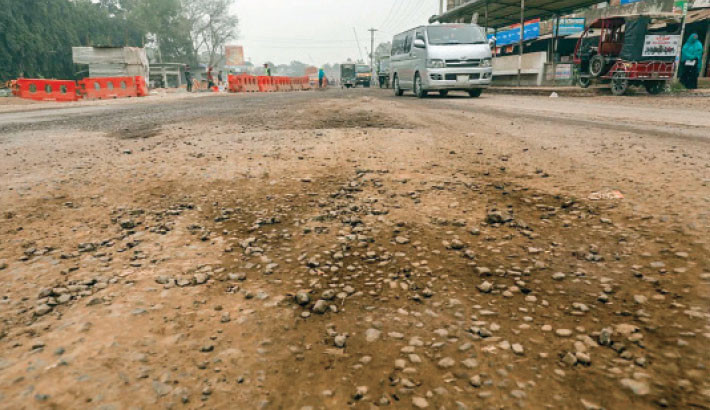Kushtia-Khulna Highway crumbles: 54km damaged in just 2 years
Slow progress, irregularities plague construction
Amanur Aman, from Jashore
Published: 03 Sep 2024

Jashore and Jhenaidah portions of the Kushtia-Khulna highway, stretching over 54 kilometres, have severely been worn out just two years after it was constructed. The photo was taken on Monday. Photo: Daily Sun
The Kushtia-Khulna highway’s Jashore and Jhenaidah sections, stretching over 54 kilometres, have been severely damaged within just two years of their construction, causing considerable inconvenience for commuters.
The 168-km highway serves as the sole route connecting nine northern and ten southwestern districts of the country.
The construction of this crucial highway, which links Kolkata and Dhaka, commenced in 2018 and was initially expected to be completed by 2020.
However, it was not finished until 2022. A recent inspection revealed that large potholes have developed between the Palbari intersection in Jashore and Pagla Kanai in Jhenaidah.
The stretch from Monihar cinema hall to Rajghat in Noapara is particularly dangerous, marred by potholes, cracks, and uneven surfaces, rendering it unsafe for vehicles.
Thousands of buses and trucks, including those travelling regional routes from Khulna, Dhaka, and Kushtia, use this road daily. The Khulna, Kushtia, and Jashore regions are recognised as industrial hubs in Bangladesh, playing a significant role in the country’s industrial and commercial sectors.
Notably, Mongla Port, the country’s second-largest seaport, is located in this division, while Jashore hosts the largest land port, and the Chuadanga district is home to Carew and Company, Asia’s largest sugar factory.
Kushtia also contains several heavy industrial areas. The Roads and Highways Department (RHD) allocated Tk2,100 crore for the renovation, partial renovation, and full construction of the 168 km highway between 2014 and 2017.
According to sources from the Jashore RHD, approval was given in 2017 for the construction of a 38 km road from the Palbari intersection in Jashore city to Rajghat in Abhaynagar on the Jashore-Khulna highway, with a budget of Tk321 crore.
Construction began in May 2018, with “Tama Construction” completing 19 km of the project and “Mahbub Brothers” completing the remaining 19 km.
However, the project faced delays due to COVID-19 and weather-related issues, extending the completion date to June 2022 and increasing the cost by an additional Tk27 crore, bringing the total to Tk348 crore.
Within a month of the road being handed over to the authorities, problems such as swelling, rut depression, and potholes appeared along 16 km of the road in the Jashore and Jhenaidah sections.
RHD sources indicated that a proposal was submitted to the Ministry of Road Transport and Bridges in June last year, requesting Tk200 crore for the renovation of concrete-formed roads and railway track restoration on the existing inclined roads. The ministry has sanctioned Tk160 crore for this purpose.
RHD officials have instructed “Mahbub Brothers” and “Tama Construction” to rehabilitate the concrete cast roads as field roads, and work is currently underway.
Previously, there were allegations of serious irregularities against the contractor from the very start of the construction work.
Witnesses reported that the contractor had breached road construction regulations by removing old salted stones from the road and reusing them in wells.
Despite being instructed to excavate a five-foot trench for the road foundation, the contractor filled the trench with previously excavated material, without adding new stones, sand, or gravel.
Syed Tariqul Islam, a subcontractor for Tama Construction, denied any claims of irregularities and stated that neither the highway department nor BUET could question the quality of the work. He attributed the road’s poor condition to the excessive heavy traffic on the highway.
A source revealed that during the pandemic, the country faced difficulties in sourcing high-quality field materials for highway construction, resulting in the need to import pitch chips from India, which were of substandard quality.
Golam Kibria, executive engineer of Jashore RHD, attributed the road’s deterioration to overloading and questioned whether road users were adhering to regulations.
He noted that 16 km of the road will be reconstructed under the new allocation, following recommendations from BUET and senior RHD experts.
Meanwhile, work has begun on a 4 km project in the first phase at a cost of Tk40 crore. He expressed optimism that traffic issues will be resolved once the welding process is completed.

